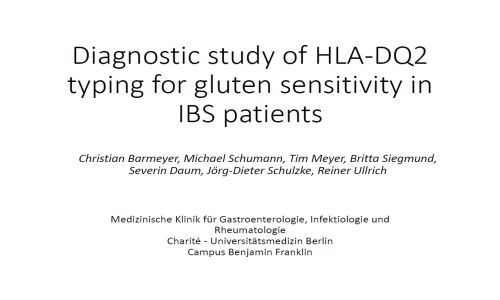Correctly diagnosing irritable bowel syndrome
The non-specific nature of typical gastrointestinal symptoms associated with irritable bowel syndrome (IBS) can be a barrier to the diagnosis of this condition.
The diagnostic approach should begin with a detailed medical history to correlate the symptoms of the patient with those typical of IBS. The patient should also be asked for a subjective assessment of the severity and impact of symptoms on daily life in order to gain an understanding of the disease burden for the patient. Exclusion of other potential causes in order to avoid mis-diagnosis.
Recurrent abdominal pain or discomfort at least 3 days/month in the last 3 months associated with two or more of the following:
Despite the availability of Rome III diagnostic criteria, it may still be challenging for healthcare professionals to differentiate IBS from organic disease such as bowel cancer or inflammatory bowel disease, bile acid diarrhea, celiac disease/NCGS or gastrointestinal food allergy. For example, research suggests that undetected celiac disease is present in more than 4% of patients with typical IBS [3]. A detailed case history should be taken and if suspicion arises or red flags are noted then patients should be referred for the appropriate tests or investigations.
Diagnosis according to definition
The Rome III criteria [1,2] are the gold standard for IBS diagnosis. These are outlined below:Recurrent abdominal pain or discomfort at least 3 days/month in the last 3 months associated with two or more of the following:
- Improvement with defecation
- Onset associated with a change in frequency of stool
- Onset associated with a change in form (appearance) of stool
Despite the availability of Rome III diagnostic criteria, it may still be challenging for healthcare professionals to differentiate IBS from organic disease such as bowel cancer or inflammatory bowel disease, bile acid diarrhea, celiac disease/NCGS or gastrointestinal food allergy. For example, research suggests that undetected celiac disease is present in more than 4% of patients with typical IBS [3]. A detailed case history should be taken and if suspicion arises or red flags are noted then patients should be referred for the appropriate tests or investigations.
Red flag symptoms
The presence of certain ‘red flag’ symptoms in a patient presenting with suspected IBS may indicate an alternative diagnosis and therefore prompt further investigation by the clinician [4]. Such symptoms are outlined below:
- Unintentional and unexplained weight loss
- Rectal bleeding
- Family history of bowel or ovarian cancer
- A change in bowel habit to looser and/or more frequent stools persisting for more than 6 weeks in a person aged over 60 years
- Unexplained anemia
- Abdominal masses
- Rectal masses
- Inflammatory markers for inflammatory bowel disease
References
- Drossman DA. The functional gastrointestinal disorders and the Rome III process. Gastroenterology. 2006;130(5):1377-90.
- Longstreth GF, Thompson WG, Chey WD, Houghton LA, Mearin F, Spiller RC. Functional bowel disorders. Gastroenterology. 2006;130(5):1480-91.
- Sanders DS, Carter MJ, Hurlstone DP et al. Association of adult coeliac disease with irritable bowel syndrome: a case-control study in patients fulfilling ROME II criteria referred to secondary care. Lancet 2001; 358: 1504-1508
- National Institute for Health and Care Excellence. Irritable bowel syndrome in adults: diagnosis and management of irritable bowel syndrome in primary care. London: NICE; 2015.
Further information on this topic
Presentations
1
Show all

Diagnostic study of HLA-DQ2 typing for gluten sensitivity in IBS patients (2015)
Christian Barmeyer, Michael Schumann, Tim Meyer, Britta Siegmund, Severin Daum, Jörg-Dieter Schulzke, Reiner Ullrich
Medizinische Klinik für Gastroenterologie, Infektiologie und Rheumatologie
Charité - Universitätsmedizin Berlin
Campus Benjamin Franklin
16th International Coeliac Disease Symposium 2015 in Prague
Pre-Conference Workshop on Gluten Sensitivity "The Evolving Planet of Gluten Related Disorders"
Medizinische Klinik für Gastroenterologie, Infektiologie und Rheumatologie
Charité - Universitätsmedizin Berlin
Campus Benjamin Franklin
16th International Coeliac Disease Symposium 2015 in Prague
Pre-Conference Workshop on Gluten Sensitivity "The Evolving Planet of Gluten Related Disorders"

Diagnostic study of HLA-DQ2 typing for gluten sensitivity in IBS patients (2015)
Christian Barmeyer, Michael Schumann, Tim Meyer, Britta Siegmund, Seve...
www.drschaer-institute.com

